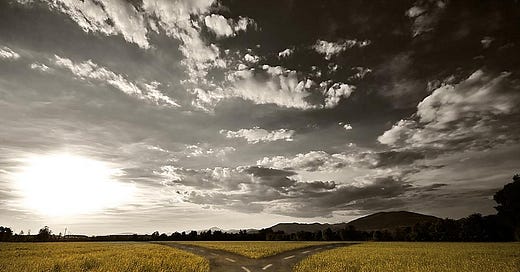Youngkin is the not end of Trumpism
He represents a metastatic evolution of Trumpism that reinstitutionalizes a dangerous, backward-looking worldview that will make the transformation that humanity craves (and desperately needs) harder.
Just because Governor-elect Youngkin didn't campaign with and publicly embrace President Trump through Virginia's general election doesn't mean he distanced himself from Trumpism. The idea that he did is laughable. President Trump doesn't believe in anything: he was a messy, crash-test vehicle willing to embrace whatever was most likely to feed his desire for power and attention. "Trumpism" is not a new ideology: it is just the latest catchy, hot-take label for a backward-looking, future-fearing worldview eager to blame and others for some perceived decline while ensuring the protection of wealth and privilege. President Trump was a vehicle for that worldview — a fiery, defiant cultural reassertion of that worldview, and his break-it-all, burn-it-down tone about institutions and democracy is just a mechanism for ensuring the minority rule required to support the continued imposition of that worldview on a growing majority. President Trump did his work, so that now Youngkin (and others like him) can do his.
Our next governor of Virginia is a more palatable container for the same Trumpian worldview of a nation focused on creating wealth and protecting property at the expense of humanity. Voters eager to thumb their noses at urban, know-it-all, dismissive elites loved President’s Trump’s grand “fuck you” stance, but the noisiness and immorality was unseamly to many — particularly Suburban conservative women. Youngkin’s posture and style is the more family- and brand-friendly evolution. Trump was the culture-realigning, not-quite-burned-out meteor that jerked us back to an older debate posture and set the groundwork to undermine the systems and norms we need to continue to advance society. Youngkin (and politicians like him) is the way to re-institutionalize that worldview for another generation. Trump is Goldwater (but won): Youngkin is Reagan.
We've got work to do. We must begin by ensuring that the systems and institutions that enable representative government function and continue our American tradition of the orderly transfer of power. We also need to put fire behind an optimistic view of the future that includes more people, especially traditional working-class, rural people, in a view of the future that not only creates space for them but specifically invites them in to a community that wants and needs them. The justice and equity we must demand for traditionally excluded and oppressed communities elevate communities everywhere, are essential for everyone — including the working-class, non-urban electorate who felt heard and seen by President Trump’s anti-liberal antics. Turning to President Trump for belonging in part because they felt disregarded and disrespected by Democrats. If we can shape our conversation about the future in those terms, there is a massive majority (60-70%) clamoring for a worldview that is kind, thriving, community-centric, and just. But we need to be sure we can speak to the listening of that entire majority.
This is not a call for moderation or faux, believe-in-nothing centrism. It’s actually the opposite: we need more ambition and more clarity about what real transformation looks like. But we need to find ways to tell the story of our future that does not scare the shit out of people and does not tell anyone they just don’t matter. And because I don’t want this to be just another postmortem diagnosis without at least some clarity about the direction I think we need to go and what I mean, here are a couple of examples of the shifting perspective about the future that could shape the way we invite America to reconsider the future of our society. Instead of talking about the automation revolution in the context of replacement and job loss, let’s talk about it (and design policies that demand it) in the context of freedom and augmentation. Instead of talking about a universal basic income as protection against a cruel system of inequality, let’s talk about it as a way of investing in all our citizens all the time as a way to enable more creativity and innovation. Instead of setting up a wealth tax in a way that feels like a mechanism to make being a robber baron slightly less expensive or what can be misinterpreted (intentionally or otherwise) as a punishment for success, let’s talk about developing a culture of commitment to community that asks our business leaders to stop being robber barons and positions taxes not as something to avoid or minimize but as a mechanism to invest and re-invest in our communities.
We need our plans for transformation to be actually transformative. And how we choose to talk about that transformation as a terrifying inevitability to delay or a welcome path we’ve been clamoring for for years — which we embrace may be the difference between ending our frustrating era of minority rule or of accidentally contributing to cementing it for another generation.




